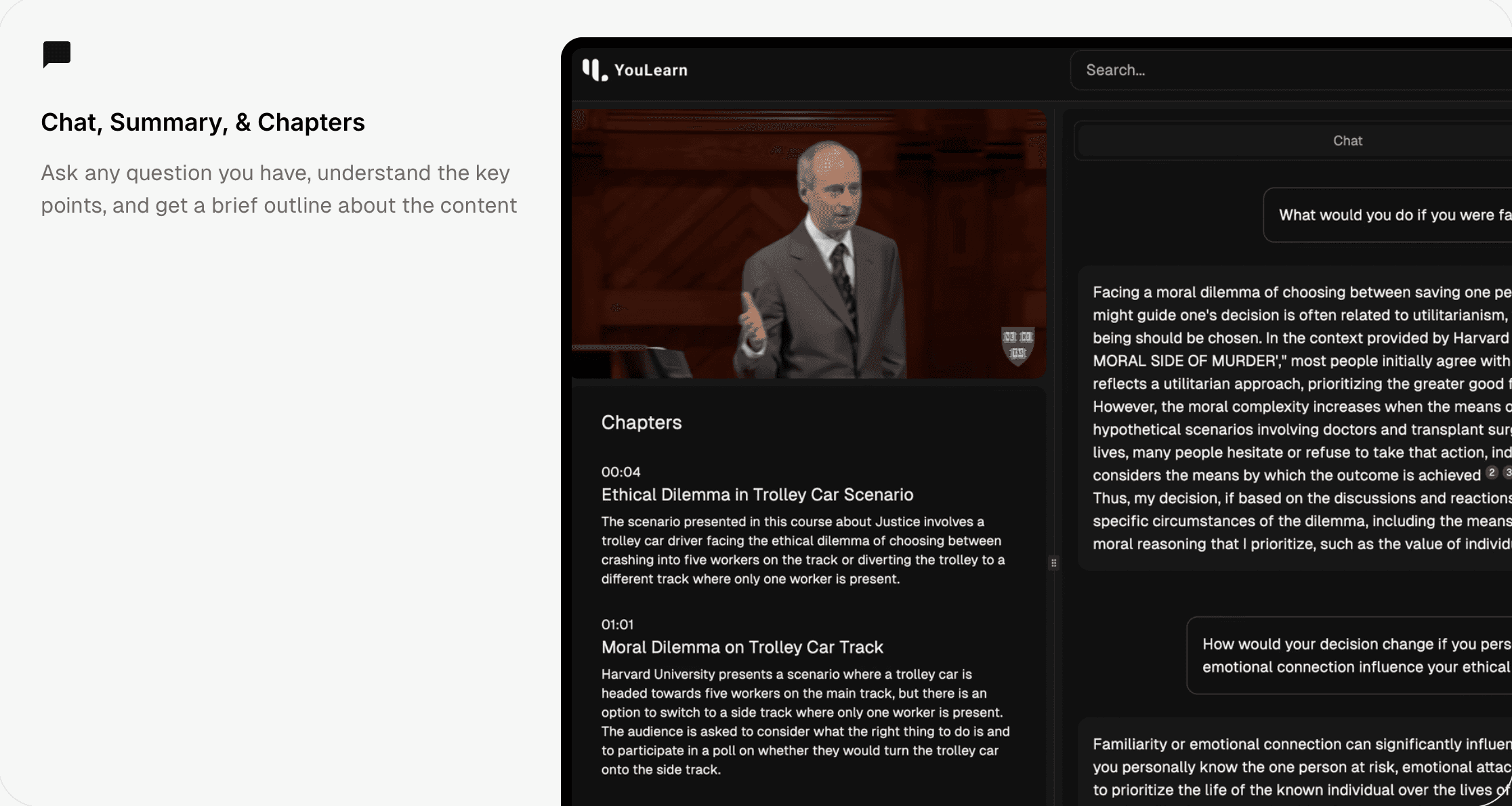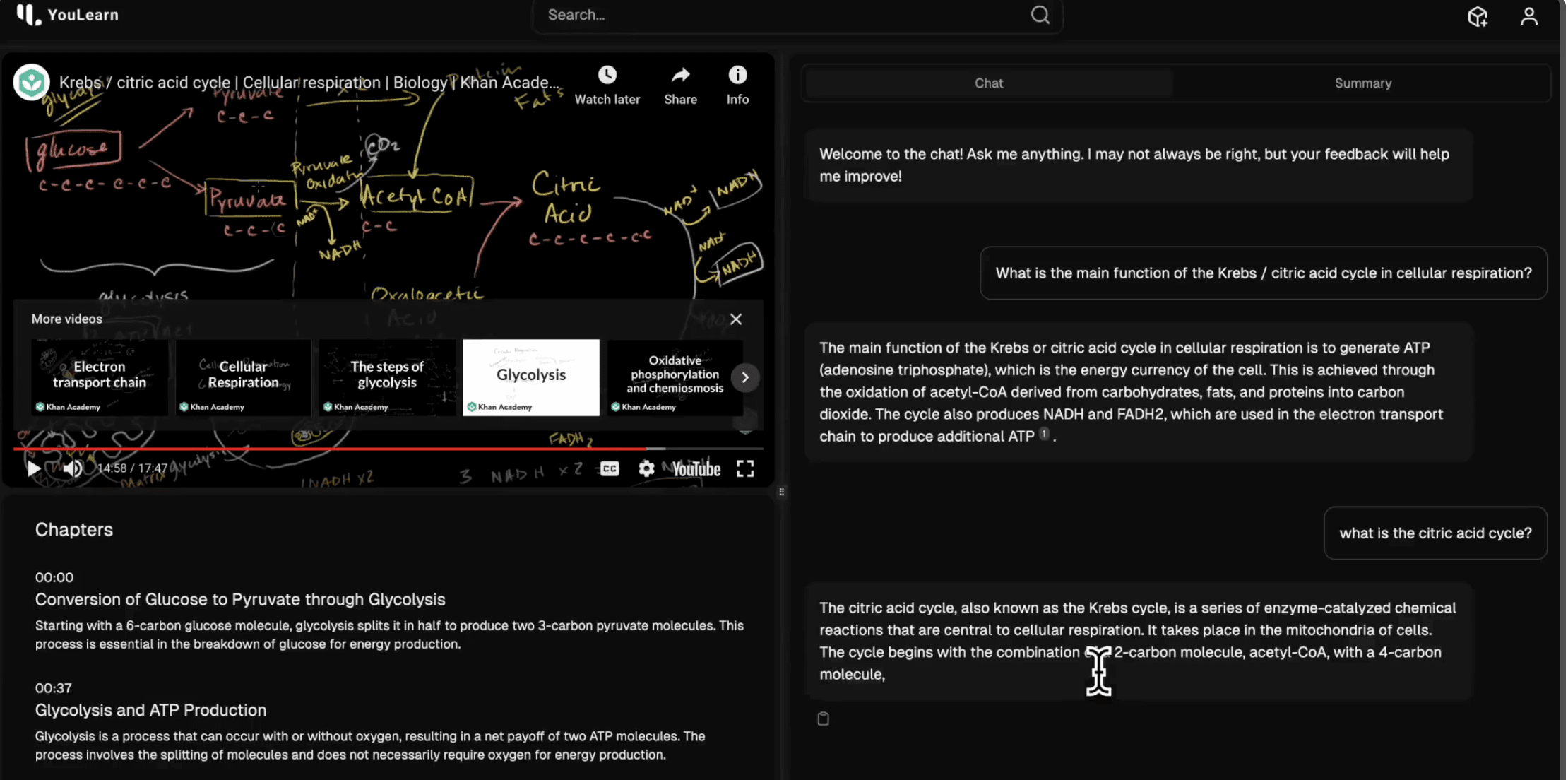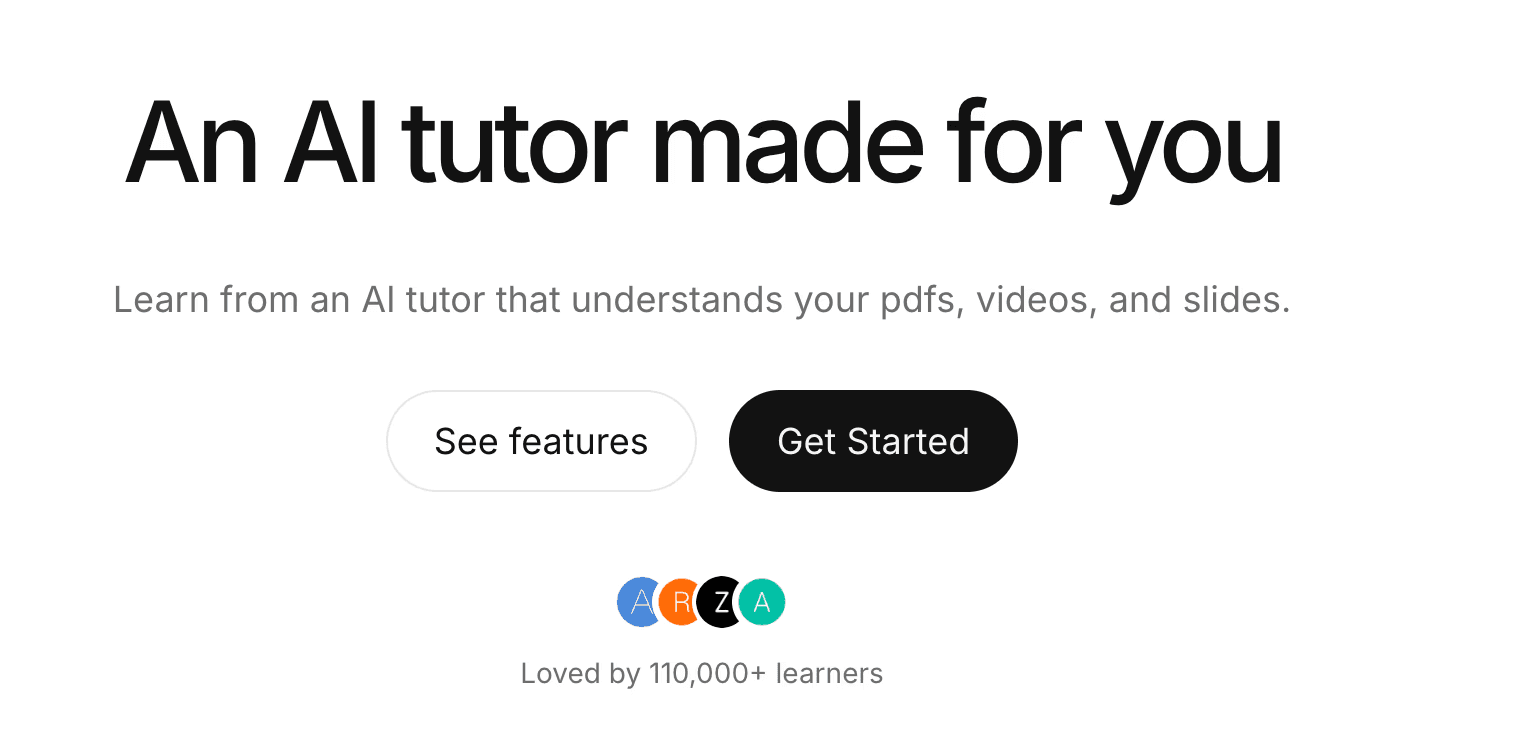28 Best Study Methods and Tips For Acing Your Exams
Sep 24, 2024

YouLearn Team
When students fall behind in their studies, they often panic and try to cram information at the last minute. This always ends poorly. Students memorize random facts instead of learning the material to regurgitate on tests. If you’ve ever done this yourself, you know how it feels to get that test back and realize you didn’t know any of the material, that it was all gone as soon as the test was over. So, How to Be a Better Student?
This is why finding the best study method for your unique learning style is essential. Not only does it help you retain information, but it can also reduce anxiety when preparing for an upcoming test or project. This guide will help you find the best study method to stop stressing about being a better student and enjoying your time in school.
One way to find the best study method for your needs is with personalized learning through artificial intelligence. YouLearn’s personal AI tutor can help you achieve your academic goals while relieving stress and anxiety.
Table of Contents
What Is The Most Effective Method For Studying?

1. Avoid Last-Minute Studying
It can be tempting to wait until the last minute to study for a big test. Who hasn’t pulled an all-nighter before an exam? However, research shows that cramming doesn’t improve long-term learning. Students may perform well on a test they’ve crammed, but that doesn’t mean they’ve truly learned the material. Instead of cramming, studies have shown that studying with the goal of long-term retention is best for learning overall.
2. Organize Your Study Time
Creating a study plan with specific goals can help you feel more prepared and can give you a roadmap to follow. “Procrastination is one mistake that students often make when transitioning to a university-level course load,” says Schwab. “Often, students are used to less intensive workloads in high school, so one of my biggest pieces of advice is don’t cram. Set yourself a study schedule ahead of time and stick to it.”
3. Don’t Be Afraid to Ask for Help
You don’t have to struggle through complex material on your own. Many students are not used to seeking help in high school, but seeking extra support is expected in college. “Be proactive about identifying areas where you need assistance and seek out that assistance immediately,” our guide to pursuing a biology major explains. “The longer you wait, the more difficult it becomes to catch up.”
4. Study with Your Peers
Your fellow students are likely going through the same struggles that you are. Reach out to classmates and form a study group to go over material together, brainstorm, and to support each other through challenges. Having other people to study with means you can explain the material to one another, quiz each other, and build a network you can rely on throughout the rest of the class—and beyond.
5. Discover Your Learning Style
Determining what study methods work best for you might take some time (and trial and error!). There are various ways to test your knowledge beyond simply reviewing your notes or flashcards. Schwab recommends trying different strategies through the process of metacognition. Metacognition involves thinking about your cognitive processes and can help you figure out what study methods are most effective for you.
Schwab suggests practicing the following steps: Before reading a new chapter or watching a lecture, review what you already know about the topic and what you expect to learn. As you read or listen, take additional notes about new information, such as related topics the material reminds you of or potential connections to other courses. Also, note down questions you have. Afterward, summarise what I’ve learned and seek answers to your remaining questions.
6. Take Breaks
The brain can only absorb so much information at a time. According to the National Institutes of Health, research has shown that taking breaks between study sessions boosts retention. Studies have shown that wakeful rest is as essential as practicing a new skill. Rest allows our brains to compress and consolidate memories of what we practiced. Ensure you allow enough time, relaxation, and sleep between study sessions so your brain will be refreshed and ready to accept new information.
7. Create a Good Study Environment
Where you study can be just as important as how you study. Find a space that is free of distractions and has all the materials and supplies you need on hand. Eat a snack and have a water bottle close by so you’re properly fueled for your study session.
8. Reward Yourself
Studying can be mentally and emotionally exhausting, and keeping your stamina up can be challenging. Studies have shown that rewarding yourself during work can increase the enjoyment and interest in a given task. According to an article for Science Daily, studies have shown that small rewards throughout the process can help keep motivation rather than saving it all until the end. Next time you finish a particularly challenging study session, treat yourself to ice cream or an episode of your favorite show.
9. Review Information Regularly
Practicing the information you’ve learned is the best way to retain information. Researchers Elizabeth and Robert Bjork have argued that “desirable difficulties” can enhance learning. For example, testing yourself with flashcards is more complex than simply reading a textbook, but it will lead to better long-term learning. “One common analogy is weightlifting—you have to actually ‘exercise those muscles’ to strengthen your memories ultimately,” adds Schwab.
10. Set SMART Goals
Setting specific goals along your studying journey can show how much progress you’ve made. Psychology Today recommends using the SMART method:
Specific
Set specific goals with an actionable plan, such as “I will study every day between 2 and 4 p.m. at the library.” A measurable plan is to study a certain number of hours or raise your exam score by a confident percentage to give you a quantifiable benchmark.
Your goals must be realistic so you don’t get discouraged. For example, if I currently study two hours per week, I’ll increase my time to three or four hours rather than ten times. Keep your goals consistent with your academic calendar and other responsibilities.
Related Reading
• How to Pass a Test
• How to Be a Good Student
• Back to School Tips
How Can I Focus 100% On Studying

1. Create a Study Schedule to Boost Productivity
By now, you’ll have a good idea of when essays are due, and even if you don’t know the exact dates of individual exams, you should see the week(s) that exams are scheduled for. So, get a head start and map out your work schedule now. Whether reading, researching, writing, or revising, give yourself a target to achieve at the end of each week so you know you’re on track to have everything ready in time for the deadlines. Investing in a wall calendar or diary is a good idea as you can mark important dates. It will help you to see how much time you have left and when you will work on what.
2. Organize Your Study Space
If you’re planning on studying from home, ensure your room is tidy, and your desk is clear of clutter. As they say, clean space creates a clear mind – which you need when working. You’ll also find it easier to focus if your study space is somewhere you enjoy being. A potted plant and decent lighting are small steps to creating your ultimate study haven. Calm music and scented reed diffusers can help relax your senses, putting you in a reasonable frame of mind to get some work done.
3. Take Regular Breaks
Studies repeatedly show that productivity increases when students take regular breaks. By breaking down your revision or essay writing into manageable chunks, you’re more likely to remain focused and keep your brain engaged on the subject at hand. For every 45 minutes of solid work you do, take a 15-minute break away from your desk. Whether it’s popping outside for fresh air, having a quick tidy, or doing some stretches, we guarantee your brain will thank you later!
4. Avoid Social Media Distractions
Nowadays, it’s almost too easy to be distracted by social media. When your phone buzzes in your pocket, it’s impossible to ignore the alluring call of a Snapchat or Instagram notification. And before you know it, you’ve spent the afternoon scrolling through cute animal pictures and funny videos, and no work has been done. But fear not; software developers have found a way to help students when they need to focus.
You can download browser extensions such as ‘StayFocusd,’ which blocks your most distracting websites for a set amount of time. Smartphone users can install apps such as ‘Offtime,’ which allow you to filter modes such as Work or Friends so you can access only the things you need and won’t be distracted by any unnecessary gaming or social media apps.
5. Eat Well and Stay Hydrated
During exam periods, it’s often the case that students become so focused on their work that they forget to focus on their well-being. The easiest way to help yourself perform to the best of your ability is to stay hydrated and avoid junk food. Set a reminder on your phone to drink a large glass of water every couple of hours and snack on healthy fruit and nuts during your studies. A lack of water or eating foods with high levels of fat will make you feel irritable and lethargic, which is the last thing you’ll want when trying to be productive!
6. Reward Yourself for Studying Hard
Rewarding yourself for studying is critical to staying motivated. These can be small rewards, such as a square of chocolate for each paragraph you write or watching an episode of your favorite Netflix series when you’ve mastered revising a specific topic. When you feel you’ve been working hard, assignments have been handed in, and exams finished, reward yourself with more significant things such as a night out with friends or buying those pair of boots you’ve had your eye on for months. Remember, because it’s exam season, it doesn’t mean you shouldn’t enjoy yourself.
7. Don’t Stay Up All Night Studying
You may think that working all night keeps you on track with your studies. But doing all-nighters and functioning without sleep can severely impact your health and, in turn, impede your work. A good night’s sleep is essential to help you stay focused and learn efficiently. Sleep helps consolidate memory, which is necessary when studying and converting short-term to long-term memory. So, swap the extra cups of coffee or cans of Red Bull for your bed and get the required hours of sleep you need every night.
Youlearn’s Your AI Tutor

YouLearn is your AI tutor, designed to supercharge your learning from YouTube videos, PDFs, and slides. Our AI chats with you about the content, provide quick summaries, and breaks information into digestible chapters.
Whether you are a college student or a self-learner, we help you grasp material faster and more effectively. Just upload your content, and our AI transforms it into an interactive learning experience. With YouLearn, you're set to learn more intelligently, not more complicatedly. Learn anything with ease for free today with YouLearn's personal AI tutor.
What Is The 2/3, 5/7 Study Method for Effective Revision?

The 2/3, 5/7 revision method focuses on the intervals at which revision occurs after initial learning.
This approach allows space out revision sessions, introducing effective recall techniques known to improve memory. Here’s how it works:
Day 1
You learn the material.
Day 2 & Day 3
These are revision days of the learning achieved on Day 1.
Day 4
This is a rest day.
Day 5
You re-visit the work.
Day 6
This is another rest day.
Day 7
This is your last re-visit opportunity before you write your exam.
Following the 2/3, 5/7 method will keep you on track with your revision. It breaks the process into manageable chunks so you’re not overwhelmed and can perform effectively.
Related Reading
• Tips for School
• How to Do Good in School
• Study Strategies for High School Students
• College Study Tips
• Active Study Methods
11 Best Study Methods and Tips For Acing Your Exams

1. Use YouLearn AI for Better Learning
YouLearn is your AI tutor, designed to supercharge your learning from YouTube videos, PDFs, and slides. Our AI chats with you about the content, provide quick summaries, and breaks information into digestible chapters.
YouLearn helps you grasp material faster and more effectively. Just upload your content, and our AI transforms it into an interactive learning experience. With YouLearn, you're set to learn more intelligently, not harder. Learn anything with ease for free today with YouLearn's personal AI tutor.

2. The SQ3R Studying Technique
The SQ3R method can be one of the best studying techniques to help students identify key facts and retain information within their textbooks. SQ3R (or SQRRR) is an acronym for the five steps of the reading comprehension process. Try this process for a more efficient and effective study session:
Survey
Instead of reading the entire book, start by skimming the first chapter and taking notes on headings, subheadings, images, or other standout features like charts.
Question
Formulate questions around the chapter’s content, such as: What is this chapter about? What do I already know about this subject?
Read
Begin reading the chapter and look for answers to the questions you formulated.
Recite
After reading a section, summarize in your own words what you just read. Try recalling and identifying major points and answering questions from the second step.
Review
Review the material once you have finished the chapter to understand it fully. Then, quiz yourself on the questions you created and re-read any necessary portions.
3. Retrieval Practice
Retrieval practice is a studying technique based on remembering at a later time. Recalling an answer to a question improves learning more than looking for the answer in your textbook. Remembering and writing down the answer to a flashcard is more effective than thinking you know the answer and flipping the card over early. If you practice retrieval, you are more likely to remember the information later. Below are some ways to study effectively by integrating the retrieval process into your routine.
Utilize practice tests
Use practice tests or questions to quiz yourself without looking at your book or notes.
Craft unique questions
Be your teacher and create questions you think would be on a test. Encourage others to do the same and trade questions if you're in a study group.
Use flashcards
Create flashcards, but practice your retrieval technique. Instead of flipping a card over prematurely, write the answer down and check.
4. Spaced Practice
Spaced or distributed practice is one of the best ways to study complex material. It encourages students to study over an extended period instead of cramming the night before. When our brains almost forget something, they work harder to recall that information. Spacing out your studying allows your mind to make connections between ideas and build upon the knowledge that can be easily recalled later. To try this study technique, review your material in spaced intervals similar to the schedule below:
Day 1
Learn the material in class.
Day 2
Revisit and review.
Day 3
Revisit and review.
After one week
Revisit and review.
After two weeks
Revisit and review.
When figuring out how to study effectively, start planning early. At the beginning of each semester, schedule time each day to research and review the material. Even if your exams are months away, this will help you hold yourself accountable.
5. The PQ4R Method
Like the SQ3R method, PQ4R is an acronym for the six steps in the process. It’s one of the best study methods because it takes an active approach to learning. By implementing it, you can improve memorization and understanding of a topic.
Preview
Preview the information before reading to get an idea of the subject. Skim the material and read only the headers, subheadings, and highlighted text.
Question
Ask yourself questions about the topic: What do I expect to learn? What do I already know about this topic?
Read
Read the information one section at a time and try to identify answers to your questions.
Reflect
Did you answer all of your questions? If not, go back and see if you can find the answer.
Recite
In your own words, speak or write down a summary of the information you just read.
Review
Look over the material again and answer any remaining questions.
6. The Feynman Technique
The Feynman Technique is one of the more effective study techniques for learning a concept quickly by explaining it in plain and simple terms. It’s based on “If you want to understand something well, try to explain it simply.” Attempting to explain a concept in our own words will likely help us understand it much faster.
Set the Stage
Write the subject or concept you are studying at the top of a sheet of paper and jot down everything you know about it.
ELI5
Then, explain it in your own words as if you were teaching someone who needs a basic understanding of it.
Assess & Study
Review what you wrote and identify areas where you were wrong. Then, return to your notes or reading material and determine the correct answer.
Organise, Convey & Review
Lastly, if there are any areas in your writing where you used technical terms or complex language, rewrite these sections in more straightforward terms for someone who doesn’t have the educational background you have. Review your new understanding of the subject.
7. Leitner System
The Leitner System is one of the best study techniques based on flashcards. Keep your cards in several boxes to track when to study each set. Every card starts in Box 1. If you get a card right, move it to the next box. If you get a card wrong, move it down a box or keep it in Box 1 (if it’s already there). Each box determines how much you will study each set of cards, similar to the following schedule:
Every day
Box 1
Every two days
Box 2
Every four days
Box 3
Every nine days
Box 4
Every 14 days
Box 5
8. Color-Coded Notes
Messy notes can make it hard to recall the critical points of a lecture. Writing in color is one of the best study methods because it’s a dynamic way to organize new information. It also helps you review and prioritize the most critical ideas. A 2019 study found that color can improve a person’s memory performance.
That same study found that warm colors (red and yellow) “can create a learning environment that is positive and motivating that can help learners not only to have a positive perception toward the content but also to engage and interact more with the learning materials.” It also reported that warmer colors “increase attention and elicit excitement and information.” Writing in color may seem like a no-brainer, but keep these tips for how to study effectively in mind:
Write down key points in red.
Highlight important information in yellow.
Organize topics by color.
Don’t color everything—just the critical information.
9. Mind Mapping
If you’re a visual learner, try mind mapping. It’s one of the most effective study techniques because it lets you visually organize information in a diagram. First, you write a word in the center of a blank page. From there, you write the main ideas and keywords and connect them directly to the central concept. Other related ideas will continue to branch out.
The structure of a mind map is related to how our brains store and retrieve information. Mind mapping your notes instead of just writing them down can improve your reading comprehension. It’s one of the best studying techniques for enabling you to see the big picture by communicating the hierarchy and relationships between concepts and ideas. So, how do you do it?
Grab a blank sheet of paper or use an online tool and write your study topic in the center, such as “child development.”
Connect one of your main ideas (i.e., a chapter of your book or notes) to the main topic, such as “developmental stages.”
Connect sub-branches of supporting ideas to my main branch. This is the association of ideas. For example, “Sensorimotor,” “Preoperational,” “Concrete operational,” and “Formal operational.”
Tip
Use different colors for each branch and draw pictures if it helps.
10. Exercise Before Studying
Exercise fights fatigue and can increase energy levels. If you’re struggling with how to study effectively, consider adding an exercise routine to your day. It doesn’t have to be a full hour at the gym. It can be a 20-minute workout at home or a brisk walk around your neighborhood. Anything to get your heart rate pumping. Exercising before you study:
Kickstarts brain function and can help improve memory and cognitive performance.
Releases endorphins, which can improve your mood and reduce stress levels.
11. Study Before Bed
Sleep is crucial for brain function, memory formation, and learning. According to Scott Cairney, a researcher from the University of York in the United Kingdom, studying before you sleep, whether reviewing flashcards or notes, can help improve recall. “When you are awake, you learn new things, but when you are asleep, you refine them, making it easier to retrieve and apply them correctly when needed.
This is important for how we learn and how we might help retain healthy brain functions.” When you’re asleep, the brain organizes your memories. Instead of pulling an all-nighter, study a few hours before bed and review the information in the morning.
8 Best Foods To Boost Your Brain

1. Brain Boosting Berries
Berries like blueberries, strawberries, and blackberries contain antioxidants, especially flavonoids. These compounds help reduce inflammation and oxidative stress in the brain, protecting brain cells from damage. This can improve memory and cognitive function, making berries an excellent snack for study sessions.
2. Citrus Fruits Are Smart Food for Study Sessions
Citrus fruits, including oranges, grapefruits, lemons, and limes, are high in vitamin C and are potent antioxidants. Vitamin C is essential for brain health as it helps produce neurotransmitters, the chemicals that transmit signals in the brain. This can enhance focus and concentration, making citrus fruits an intelligent choice for your study diet.
3. Dark Chocolate Has Serious Brain Power
Dark chocolate contains flavonoids, caffeine, and antioxidants, especially with 70% cocoa or more varieties. These compounds can enhance brain function by improving blood flow and reducing inflammation. Plus, the small caffeine content can give you a slight but noticeable boost in focus and alertness.
4. Nuts Are Brain-Boosting Powerhouses
Nuts, particularly walnuts and almonds, are excellent healthy fats, antioxidants, and vitamin E sources. These nutrients protect brain cells from oxidative stress and inflammation, promoting brain health. Plus, the healthy fats provide a steady energy source, helping you stay focused during long study sessions.
5. Eggs Are Good for Your Brain
Eggs are a good source of several nutrients for brain health, including vitamins B6 and B12, folate, and choline. Choline is a micronutrient that your body uses to create acetylcholine, a neurotransmitter that helps regulate mood and memory.
6. Avocados Are Full of Healthy Fats
Avocados are rich in monounsaturated fats, which contribute to healthy blood flow. This improves cognitive function, as your brain needs a steady blood supply to work effectively. Avocados also contain vitamin K and folate, which help prevent blood clots in the brain and improve cognitive function, particularly memory and concentration.
7. Salmon Helps Build a Better Brain
Salmon is one of the best sources of omega-3 fatty acids, which are essential for brain health. These healthy fats are known to enhance the structure of brain cells, improving their function and leading to better cognition and memory. Regular consumption of salmon can provide your brain with the omega-3s it needs to perform optimally during your study sessions.
8. Olive Oil Is a Healthy Fat That Benefits the Brain
Extra virgin olive oil is packed with powerful antioxidants known as polyphenols. These compounds help protect the brain against damage and oxidative stress, promoting health and function. Incorporating extra virgin olive oil into your diet can help enhance memory and learning, making it a valuable addition to your study diet.
Learn Anything With Ease for Free Today with YouLearn's Personal AI Tutor

YouLearn kicks studying up a notch with its interactive AI capabilities. The platform scans your uploaded content, whether a YouTube video, PDF, or slide deck, and creates a personalized learning experience.
The AI summarizes the material, breaks it into digestible chapters, and lets you quiz it on the content so you can master your material faster. If you want to learn smarter—and not just more complicated, YouLearn is your new best friend.
Related Reading
• High School Tips
• High School Study Skills
• How to Pass School
• How to Study Better in College
• How to Study by Yourself

